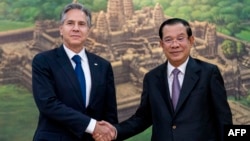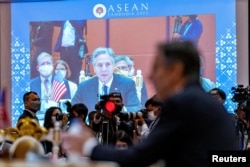PHNOM PENH — Editor’s Note: U.S. Secretary of State Antony Blinken sat down for an interview with VOA Khmer’s Sun Narin at Sokha Hotel in Phnom Penh, Cambodia, in the late afternoon of August 5, 2022, after attending the ASEAN Ministerial Meeting and meeting with this year’s rotating ASEAN Chair, Prime Minister Hun Sen of Cambodia. Topics of the interview included U.S. House Speaker Nancy Pelosi’s visit this week to Taiwan, the Myanmar crisis, and Cambodia’s electoral process and controversial Ream Naval Base. The top U.S. diplomat said the United States wants a ‘positive relationship’ with Cambodia. He emphasized the value of strengthening democracy, noting a ‘truly representative and inclusive’ national parliamentary election in 2023 would be important for building US-Cambodia ties. Secretary Blinken said Cambodia should be transparent about the use of its Ream Naval Base. The interview has been edited for clarity.
VOA Khmer: Thank you for taking the time out of your busy schedule.
Secretary Blinken: Pleasure.
VOA Khmer: Two questions first before we touch on the topics about Cambodia. One is about Taiwan and the other, Myanmar. What do you think about the visit of [US House Speaker] Pelosi to Taiwan and response from China?
Secretary Blinken: First, wonderful to be with you. Thank you. Speaker Pelosi is from our legislative branch, which is an independent, co-equal branch of government. And she [has] the right to make that visit as many members of our Congress have visited Taiwan including this year. But regardless of that, China's reaction is so disproportionate and so dangerous, whatever it feels about the visit, launching 11 ballistic missiles, including over Taiwan; sending its ships all around Taiwan. Five of the missiles that it launched landed near Japan. And I think what you're hearing from countries throughout the region, including ASEAN which put out a statement, is real concern about how destabilizing and dangerous these actions can be. So I think it’s very important to act responsibly. The United States is not going to engage in any provocative actions of our own. We think the seas should be calmed. The Taiwan Strait is of vital importance to virtually every country in the region. So much commerce goes through there. If that were interrupted, it would have a terrible impact on the global economy and on everyone's desire to recover from Covid. So I think it's incumbent upon all countries, the United States, but also China, to act responsibly and not use the visit of a member of our Congress as a pretext for engaging in potentially dangerous and destabilizing actions.
VOA Khmer: In Myanmar we see the situation worsening.
Secretary Blinken: That's right.
VOA Khmer: Will the U.S. pose any economic sanctions on the junta, including on the oil and gas enterprises?
Secretary Blinken: Well, I think what we've seen, exactly as you say, is a situation that's gone from bad to worse, including with the heinous act of executing four members of the democracy movement despite the pleas from ASEAN, from Cambodia, from many others not to do that. And I think what we're seeing is that the regime is totally unresponsive to every effort to resolve the crisis that was created with the coup. And there's an effort by ASEAN over many months to implement the five-point consensus that the regime in Myanmar signed on to, but has been totally unwilling to implement: stopping the violence, freeing the prisoners, putting Myanmar back on the path to democracy. So given that, we think that countries have to look for ways to put more pressure on the regime: economic pressure, political pressure. They should engage with all of the representatives of the people of Myanmar, including the National Unity Government. We have to press the regime to allow humanitarian assistance to reach people in Myanmar. And we should look at ways to make sure that weapons don't get to the regime. So we'll look at everything, including additional forms of economic pressure and sanctions.
VOA Khmer: And what do you think ASEAN should do besides just excluding Myanmar junta’s foreign minister from the meetings?
Secretary Blinken: Well, I think it has to take account of the fact that the regime has refused to implement the five-point consensus and draw whatever conclusions it must from that. I think making sure right now that there is nonpolitical representation in ASEAN is exactly the right step. But if this continues, I think ASEAN has to look at what that means including suspension of Myanmar.
VOA Khmer: On Cambodia, I understand that you met Prime Minister Hun Sen.
Secretary Blinken: Yes.
VOA Khmer: What did you tell him?
Secretary Blinken: We had a broad conversation about many, many different topics. I think the most important thing I said is that the United States wants a positive relationship with Cambodia. We want to build on the good foundation that we already have. We're proud of the fact that the United States is the largest export market for Cambodia. I actually saw some wonderful producers of things like cashews and mango that we're working with to help them reach international markets. We were very proud to have been able to provide vaccines during Covid, donate them and with no strings attached to help Cambodia deal with the Covid pandemic. One of the things I'm very proud of as well is that we've been returning cultural heritage artifacts that were stolen from Cambodia and making sure that they return. Something I feel very strongly about: protecting culture. And so we're working [to] deepen all of those ties. We've been working to strengthen our economic ties. But we also talked about the importance of strengthening democracy here in Cambodia and in particular making sure that as elections are going forward next year that they're truly representative and inclusive. This is something of course that Cambodia has done before: having multiparty elections. And the United States is not in favor of any particular person or any particular party. We’re in favor of a process, a democratic process that allows everyone in Cambodia to feel like they're being represented in the elections and ultimately in government.
VOA Khmer: What are potential consequences if Cambodia fails to conduct a free and fair election?
Secretary Blinken: Well, I'm not going to get into the hypotheticals. But again, I think it goes to all of our hopes for our own relationship. This is important mostly to the people of Cambodia. That's what they want. But it's also something that the United States cares about. Our Congress does. The President does. It's part of our own DNA. And we have our own challenges with democracy, but we're dealing with them very openly, very transparently, very directly. And that's really all we can ask in the country’s strive to have systems in which everyone feels like they're represented.
VOA Khmer: One last question is about the Ream naval base. What is happening with Chinese and U.S. militaries? And will the U.S. ask for the revisit after the completion of the construction?
Secretary Blinken: Well, this is first and foremost, in making sure that Cambodia has a truly independent foreign policy and does not feel pressured, of course, by anyone. And when it comes to the Ream naval base, I think countries throughout the region would be very concerned if any one country had exclusive control or use of any portion of the base or was doing anything there that undermined the security of other countries in the region. So I think it's important to have transparency and to make sure that the base is open to all and not the exclusive use of any one country.
VOA Khmer: Thank you for your time.
Secretary Blinken: Thank you very much. Good to be with you.
Watch the full interview in Khmer.





